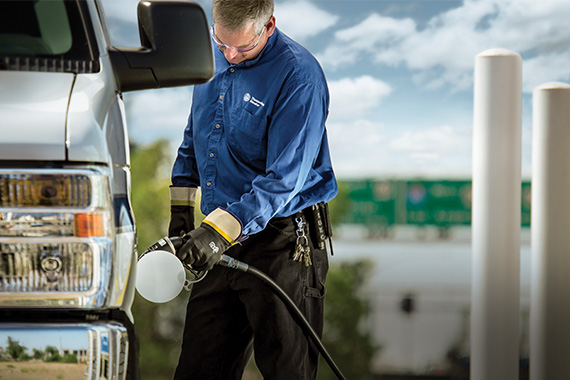
As the world continues to move toward more efficient and environmentally friendly fuels for vehicles and equipment, electric vehicles often get a lot of attention.
However, there is an alternative fuel that offers outstanding benefits without the drawbacks of electric vehicles: propane autogas!
Put clean-burning, cost-effective propane autogas to work for your business, municipality, or school district with customized propane autogas services from Pitmon Oil & Gas. We help with propane vehicle conversions, installing autogas filling stations at your location and autogas delivery tailored to your needs.
You also get the reliability and experience of Pitmon Oil & Gas, which has been providing expert commercial fuels services to South and Central Oklahoma businesses for more than 30 years.
Contact UsIf you are wondering how propane autogas can help you with your vehicles, here are some reasons that conversions to propane autogas continue to increase, not only here in Oklahoma but all over the United States.
The pricing of gasoline and diesel can be significantly affected by global markets and various factors, including geopolitical issues and natural disasters, despite oil being sourced from different regions worldwide. More than 90% of the global supply of propane autogas is produced within the United States. Unlike gasoline or diesel, autogas prices are not affected by international conflicts, sanctions or natural disasters abroad. By choosing autogas, you are contributing to America’s pursuit of enhanced energy independence.
Better for the environment: By utilizing propane autogas, you can eliminate greenhouse gas emissions and significantly decrease your fleet’s carbon footprint. Using autogas results in a 12% reduction in carbon dioxide, 20% decrease in nitrogen oxide, 40% less smog-producing hydrocarbons and a remarkable 60% reduction in carbon monoxide.
Safer for people and the planet: Autogas offers a significant reduction in emissions, making it safer and healthier for your drivers who won’t be exposed to harmful exhaust fumes from gasoline or diesel. Additionally, autogas is environmentally friendly in another crucial way. Unlike gasoline or diesel, propane does not pose a threat to air, water, soil, plant life, aquatic life or marine life in the unlikely event of a leak.
Yes, doing right by the environment is a good thing. But converting your vehicles to propane autogas is also a sound fiscal decision as well.
Autogas presents a highly cost-effective alternative, with an average savings of 30 to 40% per mile traveled. It typically costs 30% less than gasoline, and during fuel price surges, autogas becomes an even more advantageous choice compared to diesel.
There are other expenses involved with using diesel that are eliminated by converting your vehicles to propane autogas. These extra expenses encompass the procurement, storage and replacement of diesel emissions fluid. In extremely cold temperatures, using anti-gel fluids becomes imperative to avert fuel filter or line obstructions. To meet emission standards, diesel vehicles must have a diesel particulate filter, which necessitates regular cleaning. Excessive idling can lead to higher maintenance costs and overall ownership expenses.
In contrast, autogas engines offer the advantage of producing zero emissions, requiring minimal maintenance and boasting a longer lifespan when compared to diesel or gasoline vehicles. This ensures cost-effectiveness and durability in the long run.
If you’re responsible for managing a fleet of buses for your school district or municipality, consider the financially prudent choice of converting to propane autogas. This option allows you to maximize the value of taxpayer dollars while not sacrificing services.
Q. What is propane autogas?
A. Propane autogas, also known as liquid petroleum gas, is specifically designated for on-road vehicle use. With more than 23 million vehicles worldwide running on autogas, it ranks as the third most widely used automotive fuel globally, trailing only gasoline and diesel.
Q. How does an autogas engine work?
A. There are two kinds of autogas engines. One is a dedicated autogas engine. These solely run on propane autogas and allow your business to maximize the benefits of autogas such as cost savings and clean burning.
The second type is a bi-fuel engine. These engines can run on both propane autogas and gasoline. Businesses who choose bi-fuel engines can enjoy the benefits of autogas when used locally but can also use gasoline when farther away from an autogas filling station.
Propane autogas engines operate similarly to gasoline engines, using spark-ignited internal combustion engines. There are two types of propane fuel-injection systems: vapor and liquid injection. In both systems, propane is stored as a liquid in a low-pressure tank, typically located at the rear of the vehicle.
In vapor-injected systems, liquid propane flows through a fuel line into the engine compartment, where it is converted into vapor by a regulator or vaporizer. On the other hand, liquid propane injection engines do not vaporize the propane until it exits the fuel injector. This enables precise control of fuel delivery, resulting in enhanced engine performance and efficiency.
Q. Is autogas safe?
A. As we mentioned above, autogas is much safer for the environment as it does not cause damage to the soil, air or water if there’s a leak. It has a lower flammability rate than gasoline or any alternative fuel. Also, propane autogas fuel tanks are 20 times more puncture resistant than a gasoline fuel tank.
Q. Can I buy propane autogas vehicles?
A. Absolutely! Ford, Freightliner and General Motors make a wide range of autogas vehicles, from vans to trucks to buses.
Propane autogas is better for both the environment and your bottom line! Get in touch with Pitmon Oil & Gas today to learn more about our autogas services.